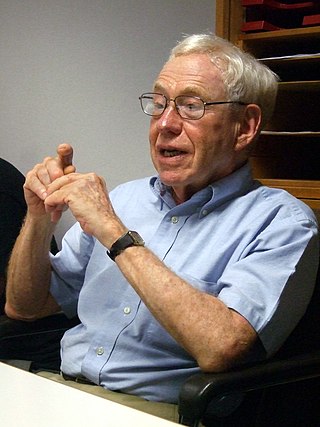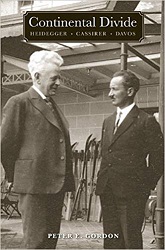
Ernst Alfred Cassirer was a German philosopher. Trained within the Neo-Kantian Marburg School, he initially followed his mentor Hermann Cohen in attempting to supply an idealistic philosophy of science.

Stanley Louis Cavell was an American philosopher. He was the Walter M. Cabot Professor of Aesthetics and the General Theory of Value at Harvard University. He worked in the fields of ethics, aesthetics, and ordinary language philosophy. As an interpreter, he produced influential works on Wittgenstein, Austin, Emerson, Thoreau, and Heidegger. His work is characterized by its conversational tone and frequent literary references.
Contemporary philosophy is the present period in the history of Western philosophy beginning at the early 20th century with the increasing professionalization of the discipline and the rise of analytic and continental philosophy.

Hubert Lederer Dreyfus was an American philosopher and a professor of philosophy at the University of California, Berkeley. His main interests included phenomenology, existentialism and the philosophy of both psychology and literature, as well as the philosophical implications of artificial intelligence. He was widely known for his exegesis of Martin Heidegger, which critics labeled "Dreydegger".
Espen Hammer is Professor of Philosophy at Temple University. Focusing on modern European thought from Kant and Hegel to Adorno and Heidegger, Hammer’s research includes critical theory, Wittgenstein and ordinary language philosophy, phenomenology, German idealism, social and political theory, and aesthetics. He has also written widely on the philosophy of literature and taken a special interest in the question of temporality.
A continental divide is a drainage divide on a continent such that the drainage basin on one side of the divide feeds into one ocean or sea, and the basin on the other side either feeds into a different ocean or sea, or is unconnected. Continental divide may also refer to:
Michael Friedman is an American philosopher who serves as Suppes Professor of Philosophy of Science and Professor, by courtesy, of German Studies at Stanford University. Friedman is best known for his work in the philosophy of science, especially on scientific explanation and the philosophy of physics, and for his historical work on Immanuel Kant. Friedman has done historical work on figures in continental philosophy such as Martin Heidegger and Ernst Cassirer. He also serves as the co-director of the Program in History and Philosophy of Science and Technology at Stanford University.
Peter Eli Gordon is an American historian of philosophy, a critical theorist, and intellectual historian. The Amabel B. James Professor of History and Faculty Affiliate in the Department of Philosophy at Harvard University, Gordon focuses on continental philosophy and modern German and French thought, with particular emphasis on the German philosophers Theodor Adorno and Martin Heidegger, critical theory, continental philosophy during the interwar crisis, and most recently, secularization and social thought in the 20th century.
The following is a bibliography of John D. Caputo's works. Caputo is an American philosopher closely associated with postmodern Christianity.

The Davos University Conferences were a project between 1928 and 1931 to create an international university at Davos in Switzerland.

The Cassirer–Heidegger debate was a 1929 encounter between Ernst Cassirer and Martin Heidegger in Davos during the Second Davos Hochschulkurs.
Alejandro Arturo Vallega Arredondo is an Italo-Latin American philosopher and painter. He is professor of philosophy at the University of Oregon. He is a Faculty Research Fellow of the Center for Gender and Africa Studies of the University of the Free State, South Africa. In his work he develops an aesthetic philosophy, in which he engages the aesthetic of pre-reflexive affective, embodied and memorial dimensions of understanding and living experience.
The Habermas–Rawls debate is the exchange which took place between John Rawls and Jürgen Habermas in The Journal of Philosophy in 1995. One major point of misunderstanding was Rawls's emphasis on social primary goods in a debate that included Habermasian notions of the public and common good.
Michael Andrew Lewis is a British philosopher. He is the co-founder and general editor of the Journal of Italian Philosophy. Lewis is known for his expertise on continental philosophy.
Miguel de Beistegui is a continental philosopher and Professor of Philosophy at the University of Warwick. He is known for his expertise on Heidegger's thought.
Daniela Vallega-Neu is a German philosopher and Professor of Philosophy at the University of Oregon. She is known for her expertise on hermeneutics, deconstruction and Heidegger's thought.

Robert Piercey is a Canadian philosopher and Professor of Philosophy at Campion College, University of Regina. He is the editor of Philosophy in Review. Piercey is known for his works on continental philosophy.
François Raffoul is an American philosopher and Professor of Philosophy and Retired Professor of Philosophy and French Studies at Louisiana State University. He is known for his works on continental thought.
Andrew J. Mitchell is an American philosopher and professor of philosophy at Emory University. He is known for his works on Heidegger's thought.
Bettina Bergo is a Canadian philosopher and Professor of Philosophy at the University of Montreal. Bergo is known for her work on continental philosophy.





